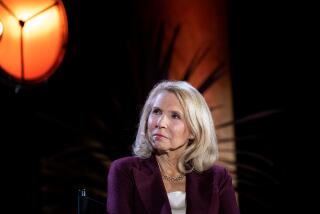Palm CEO Resigns Amid Restructuring
- Share via
Palm Inc. Thursday said Chief Executive Carl Yankowski resigned, following a tumultuous year in which the once highflying maker of pocket-sized computers saw its market share chipped away by competitors and its stock price fall 91%.
In the surprise announcement, Santa Clara, Calif.-based Palm, which dominates the hand-held market, said board Chairman Eric Benhamou will act as CEO until a successor is named.
“With Palm’s transition into two individual businesses almost complete, my role has changed, and it no longer matches my aspirations,” Yankowski said. He did not announce his future plans.
Palm shares closed down 3 cents at $2.27 on Nasdaq, far off the 52-week high of $65.75. In active after-hours trading following the announcement, the stock edged up to $2.35.
Yankowski was tapped to head Palm in December 1999, when it was still a unit of networking company 3Com Corp., for whom Benhamou served as chairman and CEO. Yankowski had worked as president and chief operating officer of Sony Corp.’s Sony Electronics Inc.
Energized by bubbling demand for the personal digital assistants, or PDAs, and firm control over both the market for the gadgets and the software that powers them, Palm entered 2001 as one of the technology sector’s hottest properties.
But by the summer, the economic slowdown, a troubled roll-out of new high-end products and aggressive price war with chief rival Handspring Inc. took its toll on the company’s share price and bottom line.
The company also had to withstand the significant growth of devices powered by Microsoft Corp.’s Pocket PC software.
And in September, Wall Street analysts were further discouraged by Palm’s decision to delay until next year a long-promised wireless device. Palm said the timing was not right, and that given the economy’s sluggish condition, a delay would not significantly affect Palm results.
Yankowski exits as Palm finalizes its plan to split its software and hardware groups into two separate, but wholly owned businesses.






